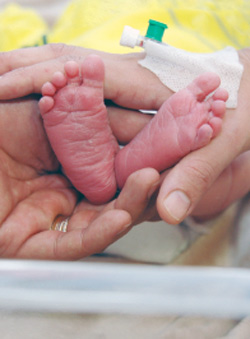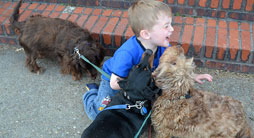How Many Visitors Are Too Many Visitors

by Faith Golden
Nicole and Steve were so excited when Mia was born that they couldn’t wait to show her off to the world. They would have introduced the entire family to Mia right after birth but Nicole had a cesarean and the hospital had a policy of a one hour bonding period with the parents only then grandparents and aunts and uncles could visit the new baby; two at a time for 5 minutes at a time before the new family was left alone again. The bonding period is a relatively new practice at some hospitals and is based on studies of the various states of consciousness that newborns go through.
One of the newborns first responses following birth is to move into a quiet but alert state. In this state, the baby is still; her body molds with her parents, her hands touch their skin, her eyes open wide and are bright and shiny. In this state, she is able to communicate with her parents for an average of 40 minutes, which may prepare the way for her future attachment to her parents, and her parent’s attachment to her. In the quiet-alert state, infants look directly into their parent’s eyes and are able to respond to voices. When newborns stay in contact with their mother in the first few hours of life, they remain in the quiet alert state longer and cry hardly at all.
Nicole was in the hospital for 2 days, and Steve stayed with her most of the time helping with Mia. On the third day when she was to be discharged, she was running a slight fever and asked to stay another day. One of the reasons that she wanted to stay the extra day was because she was barely able to rest during her hospital stay because she had so many visitors. Both Nicole and Steve had large extended families and a lot of friends whom they encouraged to, “stop by any time.” So people did and they stayed until Nicole and Steve were exhausted.
On the morning of the 4th day, Steve asked his father to help him to collect all of Nicole’s things and Mia from the hospital and the new family went home. That afternoon the procession of visitors began. The visitors came, and came and came, each group staying as long as they liked, being fed by the new parents until on the 4th day, the new parents were bleary eyed and absolutely exhausted, unable to take care of their newborn or themselves. Fortunately for them, the grandparents stepped in, spent the night and took care of Mia while Nicole and Steve slept for an entire 10 hours.
In today’s society we, especially women think we can do it all. But we can’t. The truth about the first few weeks after having a baby is that you are recovering from having a baby and for some of you having surgery. You are tired or exhausted from being awakened every 2-3 hours all night long, and if you are breastfeeding from the extra caloric demand on your body. Any way you slice it, it takes at least 6 weeks to recover from having a baby, and 10 months for your body to get back to it’s pre-pregnancy state.
You need to take care of yourself and the baby during the first few weeks postpartum. This is a time to learn about each other during the quiet-alert times, bond and attach. Here are some tips to make sure you and the baby are taken care of once at home:
- Allow others to help you. You need rest and to take care of the baby and yourself. Most women hate to be dependent on others but after childbirth and surgery you deserve and need it. If your husband can take time off work to help, that’s great.
- Use your common sense about how much you can do. If your bleeding is bright red or your bleeding increases, you are over-doing it.
- Plan on doing nothing but taking care of yourself and the baby for two weeks. Relatives and friends can help as long as they don’t make you nervous or cause you more work.
- Limit visitors to immediate family and friends only. Wear a bathrobe so they won’t stay long. It’s not your job to entertain them
While you are still in the hospital, if you have older children, they should be the first to see the new baby after the hour of bonding with you. Play with or greet your older children before you introduce the new baby. Give the older siblings a gift from the baby. A good gift for both sexes is a doll. Your older child can care for and nurture their doll while you care for the new baby. If your child is younger than 6, they are in the critical time for learning empathy and nurturing, making a doll a great gift for this age group. If you’re in the hospital more than a day, the children should visit for a short time each day. Young children have no understanding of time and so, can feel abandoned. Even though they may cry when they leave the hospital, it is better that they deal with the momentary heartbreak than that they feel abandoned. Once you are home, your older children will want to hold and explore the new baby and get to know her with an adult standing by, of course. When an older child is involved with their newborn sibling from the start, the homecoming of the baby is often less anxious. When siblings spend time with the newborn in the quiet-alert state, they become attached and they fall in love with each other.
Today, 3 months later, Nicole, Steve and Mia are an adorable family. Nicole is back to work during the day. Steve works at night and watches Mia during the day. They are no longer exhausted, but they do recommend to pregnant couples that they meet that they learn from their mistakes and follow the tips as outlined above. They are sorry that they refused help at home from family, and that they had so many visitors in the first week. For the next baby, they have said that they will spread out the visitors, have them do a chore if they choose to visit and the only visitors they allow will be immediate family. Steve summed it up when he said, “We thought we knew what was best, but we sure didn’t. For the next baby, we will take care of ourselves better, the visitors can wait.”
If you are interested in more information on preparing for baby, parenting techniques and tips that can be used in your unique family situation, read more on the It’s Aparent website, itsaparentparent.com or call (818) 995-9757 for a free consultation.
About the author: Faith Golden M.A. is a Child Development Specialist with over 20 years experience coaching and assisting families and children of all ages. She has taught Lamaze classes, was an Early Interventionist and Preschool Special Education teacher, and has worked with adults with disabilities. As the founder of It’s Aparent, Ms Golden’s unique coaching approach offers families advice on all levels, teaching parenting skills and providing support through challenges. With children, she works on learning, social, and play skills. She is an expert in special education, guiding parents through every step with her one-of-a-kind “Together” program and helping children overcome developmental delays.
© Faith Golden 2013. This material may not be copied or used in any manner without the express written permission by the author.




